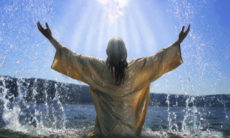Revelation 3:1-6 “To the angel of the church in Sardis write: He who has the seven Spirits of God and the seven stars, says this: “I know your deeds, that you have a name that you are alive,but you are dead. 2 WAKE UP, and strengthen the things that remain, which were about to die; for I have NOT found your deeds completed in the sight of My God. 3 So remember what you have received and heard; and keep it, and REPENT. Therefore if you do not WAKE UP, I will COME LIKE A THIEF, and you will not know at what hour I will come to you. 4 But you have a few people in Sardis who have not soiled their garments; and they will walk with Me in white, for they are worthy. 5He who overcomes will thus be clothed in white garments; and I will NOT erase his name from the book of life, and I will confess his name before My Father and before His angels. 6 He who has an ear, let him hear what the Spirit says to the churches.’
This church is referred in the letter as a dead church. Jesus gave a strong warning to this church – He told them to WAKE UP and repent or they will NOT be prepared for the His VISITATION.
Jesus quickly and clearly condemns the lifeless state of the Sardian church: He says; “I know your deeds; you have a reputation of being alive, but you are dead” (Revelation 3). This church may have had a good reputation, but they were spiritually lifeless. In other words, the church was filled with unsaved people going through the motions of religion. There were many tares among the wheat (Matthew 13:24-30).
Jesus calls for the church to repent
Jesus then says to this church; “Wake up! Strengthen what remains and is about to die, for I have not found your deeds complete in the sight of my God. Remember, therefore, what you received and heard; obey it, and repent” (Revelation 3:2-3a). To “wake up” means to start paying attention to their need of salvation, to stop being careless about their heart’s condition before God. Jesus also notes the judgment that would take place if they did not repent: “If you do not wake up, I will come like a thief, and you will not know at what time I will come to you” (Revelation 3:3b).
After the warning, Jesus encourages those in Sardis who had remained faithful: “Yet you have still a few people in Sardis who have not soiled their clothes. They will walk with me, dressed in white, for they are worthy” (Revelation 3:4). The faithful remnant had not soiled their garments (participated in sin). They are “worthy.”
The idea of walking worthily is also found in Paul’s teaching in Ephesians 4:1; Colossians 1:10; and 1 Thessalonians 2:12. To be “worthy” is to “match up” with something—the profession of faith in the mouth matches the reality of faith in the heart. The faithful ones are promised to walk with Jesus in white (see Matthew 22:11-12; Revelation 19:8).
Jesus makes a final promise to the believers in Sardis: “He who overcomes will, like them, be dressed in white. I will never blot out his name from the book of life, but will acknowledge his name before my Father and his angels” (Revelation 3:5). The one who “overcomes” is anyone who is born again (1 John 5:4). The overcomer will receive a white garment (a token of righteousness), he will never have his name removed from the book of life (a promise of eternal security), and he will be confessed by Jesus in heaven (cf. Luke 12:8).
Th reality of the Sardis church / spiritual condition
Though the church was filled with external works and activity, it was still referred to in the letter as a sleeping church. As Paul put it in 2 Timothy 3:5, they had a form of godliness, but, because of their failure to walk with the Lord, they were denying the real power of God through their hypocrisy. They were out of touch with elements of true spirituality.
Some may have been only professing Christians engaged in religious activities who had never truly trusted in Jesus Christ. More than likely, however, they were carnal believers who had made a good start, but had failed to move on, to grow and experience true spirituality. They were active, engaged in works, but temporally dead, out of fellowship with Christ (Eph. 5:14-18).
The point is they had a reputation, they were known far and wide, and they were active, filled with activity, action, and programs, just like a great deal of the church today all across America. By the world’s standards they were successful and they were probably proud of their church, but our Lord says not so, “you are dead.”
So what does He mean by “dead?”
In Scripture, death stands for the concept of separation as well as the absence of life.
- For the unbeliever, death means without spiritual life, unregenerate, and without God—separated from relationship with God.
- But for the believer, death, like sleep, is sometimes used as a symbol for carnality.
Some could have been only professing believers, and so they were spiritually dead, just professing believers involved in an active church. But I don’t think that is the emphasis here. He was talking to true believers who were spiritually carnal and working from the energy of their own resources rather than from His (the Word and the Holy Spirit).
This is a warning. A church is in danger of death:
- when the church begins to worship its own past or history, its reputation or name, or the names in the church,
- when the church is more concerned with forms than with function and life,
- when the church is more concerned with numbers and noses, than with the spiritual quality of life it is producing in its people,
- when the church is more involved with management than with ministry or with the physical more than the well being of congregants (their spiritual well being).
This illustrates the problem of institutionalism in the church, but today, we also have a new scenario that can be a part of this picture, the megachurch which has become a part of American theme. Our mega malls have been styled as “cathedrals of consumption” because they are designed to feed the consumer appetites of our lifestyle today. But if we are not careful, churches can become “cathedrals of consumption” as well.
Visit us on Facebook – Please “Like and Follow”
Click the links below to see our latest posts..
Download Audio
Download PDF









